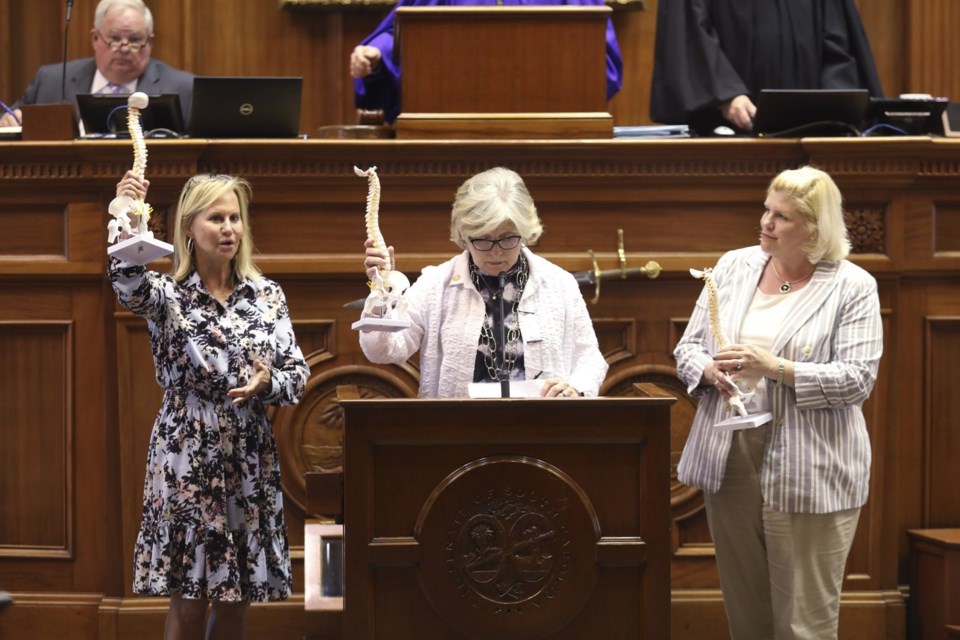COLUMBIA, S.C. (AP) — A near-total abortion ban was defeated in South Carolina with the help of the only three Republican women in the Senate, but after Tuesday’s primary, they’re losing their election bids.
Voters handed the senators – and winners of the John F. Kennedy Profile in Courage award for people who risk their careers for the greater good – two losses and a runoff after they joined with Democratic women to defeat the measure, saying a pregnant woman shouldn’t lose control of her body as soon as an egg is fertilized.
But the state had only men in the Senate in 2012 and may end up without a single Republican woman in the chamber in 2025. There are just two Democratic women among the 46 members.
“You can’t tell me that’s not a slap in the face of women,” said Sen. Katrina Shealy who is gearing up for a runoff. “Republican women lose like this over one issue when we fought so hard for other things.”
Bucking the tide
Voters on Tuesday went against a trend of having second thoughts about more restrictive abortion law.
Statewide polling has indicated a near total ban doesn’t have wide support. But turnout was low and races were in Republican-drawn districts, where experts say voters tend to be more fervent about issues like abortion.
The Republican women had forced a compromise, and the state eventually implemented a ban once cardiac activity is detected, typically around six weeks after conception.
“It’s easier to fight mini battles than it is to take on a whole statewide war,” said Dave Wilson, a conservative political consultant who has worked with groups opposing abortion. “In the mini battles, voters can turn around and say they aren’t happy with the stance you took and the way you went about it. It doesn’t take a lot of them.”
The races
Abortion wasn’t the only reason Penry Gustafson lost, said her sole opponent, Allen Blackman, who believes life begins at conception. Gustafson had less than 20% of the vote in a freshly redrawn district that no longer included her base, and where constituents complained she didn’t solve their problems.
Sen. Sandy Senn’s loss by just 31 votes to state Rep. Matt Leber is close enough for a recount, but those rarely alter a race by more than a few votes in South Carolina. The race was fraught with accusations. She posted signs with Leber’s mugshot, which he said were from inflated accusations that never led to convictions.
Leber’s attacks misconstrued Senn’s record and manipulated photos to make her look like the Joker, a DC Comics villain.
Redistricting may have hurt Senn too; her redrawn Charleston district includes more conservatives.
Gustafson thanked her supporters in a Wednesday statement, promising to continue serving the community. Senn isn't going to talk about the race until the recount is finished later this week, she said in an email. Neither woman mentioned abortion.
Leber did not responded to messages.
Shealy'
s runoff
Shealy was the only Republican woman to survive the night, but she got just 40% of the vote. She will face attorney and political newcomer Carlisle Kennedy in the June 25 runoff.
Billboards saying Shealy was not “pro-life” were all over her district in Lexington County, which led the charge to flip the state from Democratic to Republican control over the past five decades. Kennedy did not respond to messages Wednesday.
Shealy’s strategy for the primary was to stay above the fray. She will likely change tactics for the runoff, even if that alienates people uncomfortable when a woman raises her voice or takes a stand, she said Wednesday.
South Carolina’s Senate had been all-male for four years when Shealy was first elected in 2012 and rarely had more than one woman in the chamber. If she loses, there is a very good chance the Senate in 2025 will have just two women, both Democrats.
That means the perspective of women, who make up 55% of the registered voters in South Carolina, can get lost and issues she champions like free lunch for all schoolchildren may be ignored, she said.
“I broke that ceiling not for abortion rights — I broke it because we needed someone to care about children and families and veterans and old people,” Shealy said. “All these people no one was taking care of. I came in there and gave them a voice.”
Jeffrey Collins, The Associated Press




